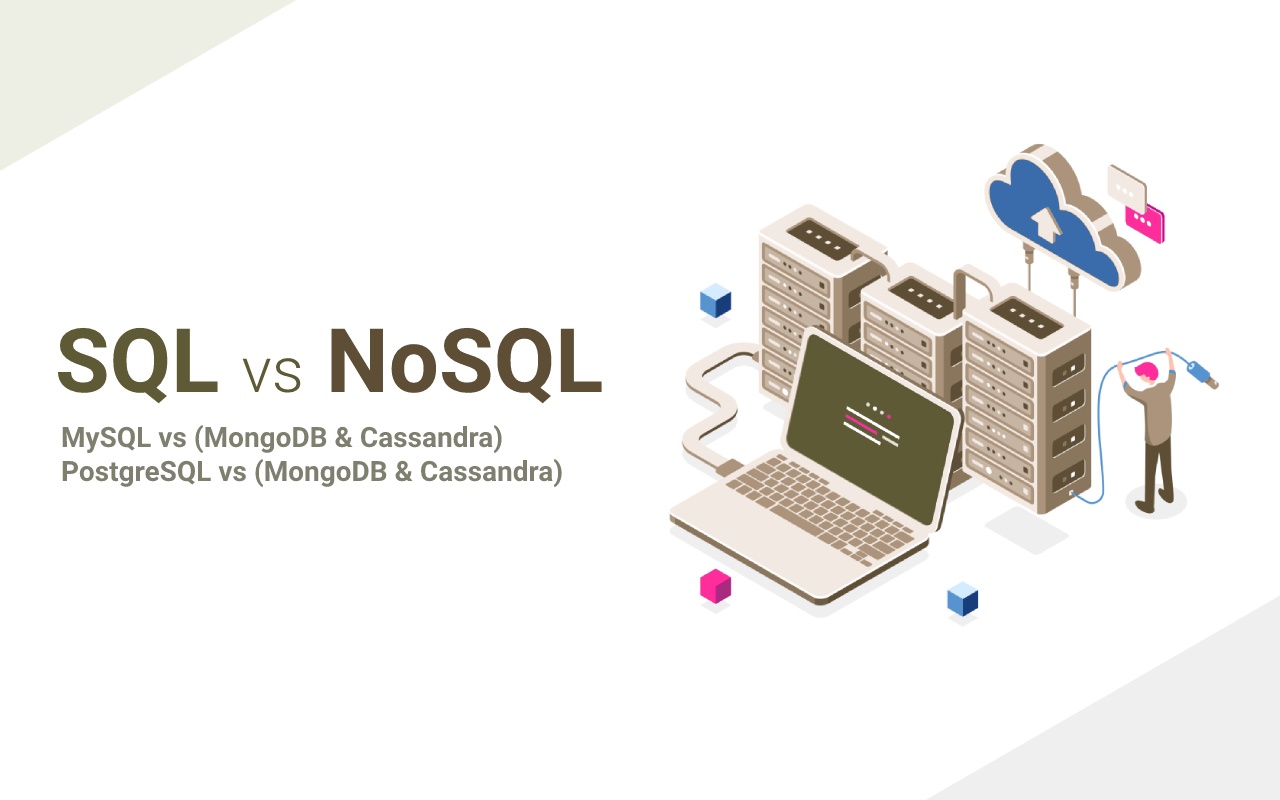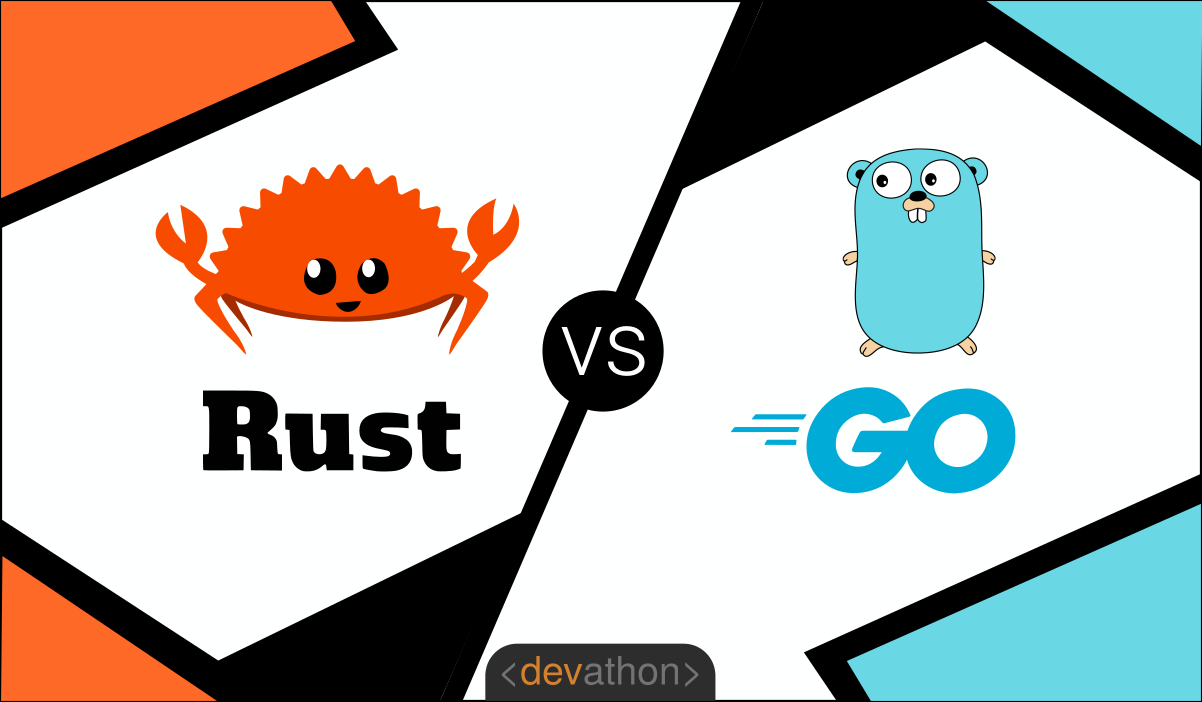
Are you an entrepreneur or a senior enterprise IT leader who is planning to undertake a web development project? You might be wondering which programming language to use. In relation to this, you might have come across programming languages like Rust and Go. You are probably weighing between Rust vs Go and trying to decide which one to use in your project.
Both Rust and Go are increasingly popular languages. Which one fits your requirements better? What are their pros and cons and which one should you choose? In this guide, we answer all of these questions so that you can make an informed decision. Read on!
Rust: An introduction
Graydon Hoare designed Rust while working with Mozilla Research. There were other contributors too, e.g., Dave Harman, and Brendan Eich. Rust is a statically-typed, compiled programming language. It’s an open-source language, and its syntax is similar to that of C++.
The first release of Rust came in 2010. Since then, developers have enhanced this language significantly. At the time of this comparison, the latest stable release of Rust is 1.42.0, which came in March 2020. Several well-known organizations use Rust, e.g.:
- Mozilla;
- Dropbox;
- Qiwi;
- Brilliant;
- Sentry;
- Postmates;
- Wantedly.
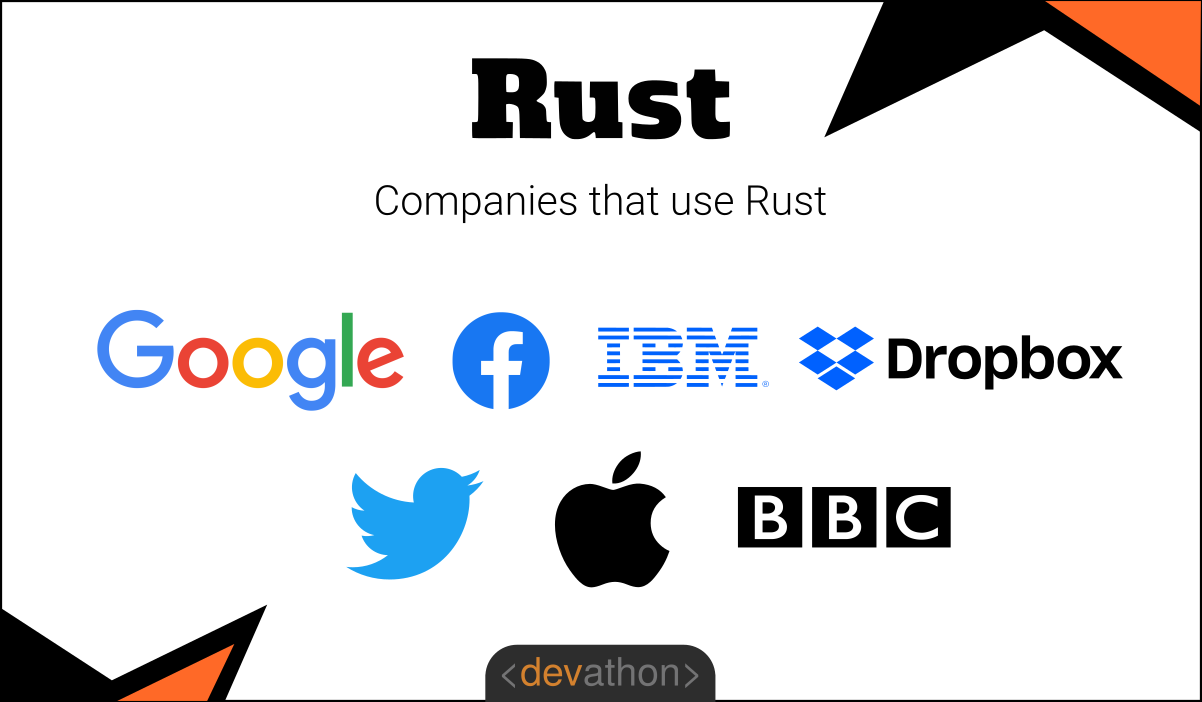
Piston, the popular game is built using Rust. Mozilla is building Rust to build Servo, a new browser engine.
Rust: Where can you use it?
A relatively new language, Rust can have varied usage. You can use Rust for systems programming.
Rust offers memory safety, moreover, this statically-typed language reduces common programming errors. As a result, if you are building a large system where security is very important, then you can use Rust. By its very design, the language reduces application security vulnerabilities.
Rust also offers speed. This makes it a good candidate for developing game engines, operating systems, file systems, and browser components. Its performance also makes Rust a smart choice to build “Virtual Reality” (VR) simulation engines.
Go: An overview
Rob Pike, Robert Greisemer, and Ken Thompson developed Go jointly. They developed it in 2007 at Google, however, they launched it for the first time in 2009. Go, or “Golang” as it’s often called, is an open-source programming language. The developers of Go modeled it after C. Go is a statically-typed, compiled language.
Go has gone through several rounds and developments. At the time of writing this article, its last stable release is 1.14.1. This release came in March 2020. The following are a few examples of well-known organizations that use Go:
- Google;
- Apple;
- Facebook;
- Twitter;
- IBM;
- Dropbox;
- BBC.

A few popular applications developed in Go are Netflix, Dropbox, Docker, and Kubernetes.
Where can you use Go?
Go is a versatile language and you can use it for several purposes. To be more specific though, you can use Go whenever you need to build a highly modular application system with high security and high speed.
You can use it for system programming and network programming. The language also has prominent usage in web app development, alternatively, you can use Go in applications involving big data or machine learning.
You can use Go to create command-line apps or scripts. If you are building a large, distributed system, then you can use Go. Finally, you can use Go to build highly-scalable network servers. Go has a lot of flexibility.
The advantages and disadvantages of Rust
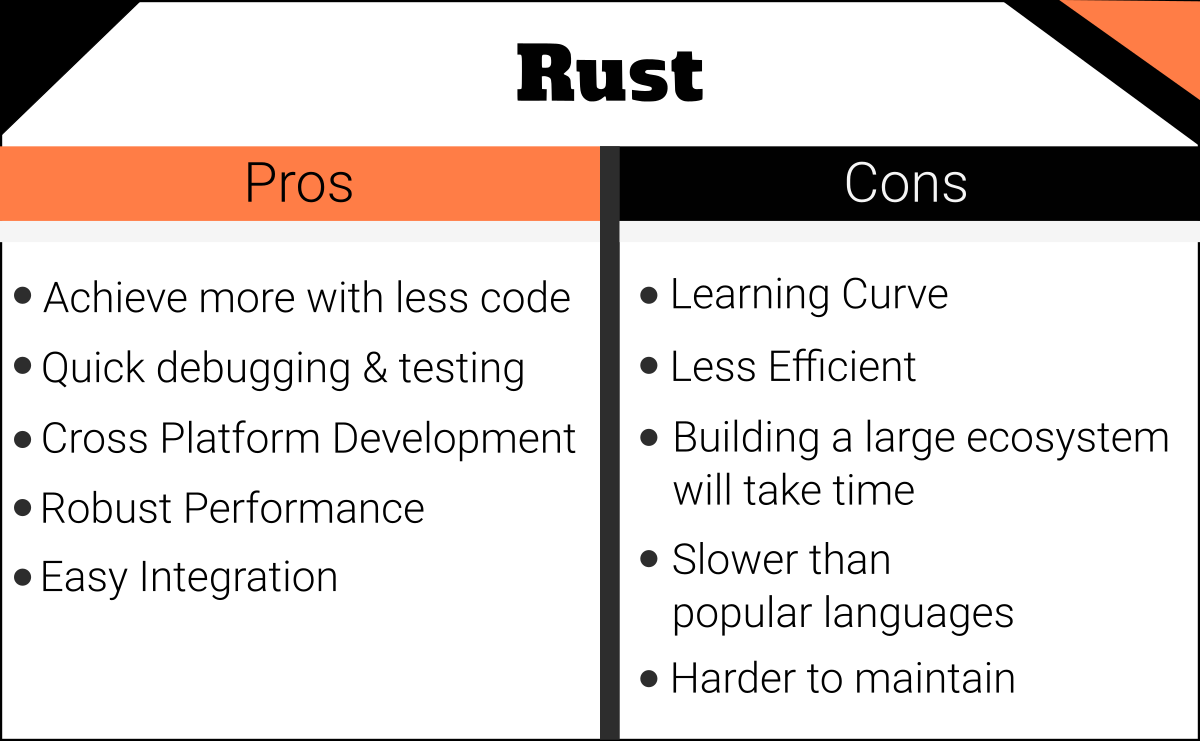 What are the pros and cons of Rust? It offers the following advantages:
What are the pros and cons of Rust? It offers the following advantages:
- Achieve more while coding less: Rust supports more complexity than several other programming languages, therefore, you can achieve more with it. E.g., it supports generics. You will find it easier to build powerful web apps using Rust.
- Quicker debugging and testing: You will find debugging and testing easier with Rust.
- Rust enables cross-platform development.
- Performant: Rust offers robust performance.
- The ease of integration: You can integrate Rust easily with C and several other popular languages.
- Safer programming: Rust enables you to eliminate errors, which results in fewer application security vulnerabilities.
- Strong community support: There is a vibrant developer community that supports Rust.
There are a few disadvantages to Rust as well, which are as follows:
- Learning curve: Developers might take longer to learn Rust due to its complexities.
- Less efficient: It takes longer to compile Rust and the code can be less efficient.
- Maintenance can be harder: Since Rust has more complexities, you could end up spending more effort to maintain apps written in it.
- It will take longer to build a large ecosystem since Rust is a relatively new language. Take the case of web development frameworks for Rust. Actix, Rocket, and Nickle are some of key web development frameworks for this language. Its illustrious competitors in the market are more established, and they have many more popular frameworks.
- Limitations in comparison to leading programming languages: Rust can leak memory in some cases, moreover, it can be slower than some popular languages.
Go: Its pros and cons
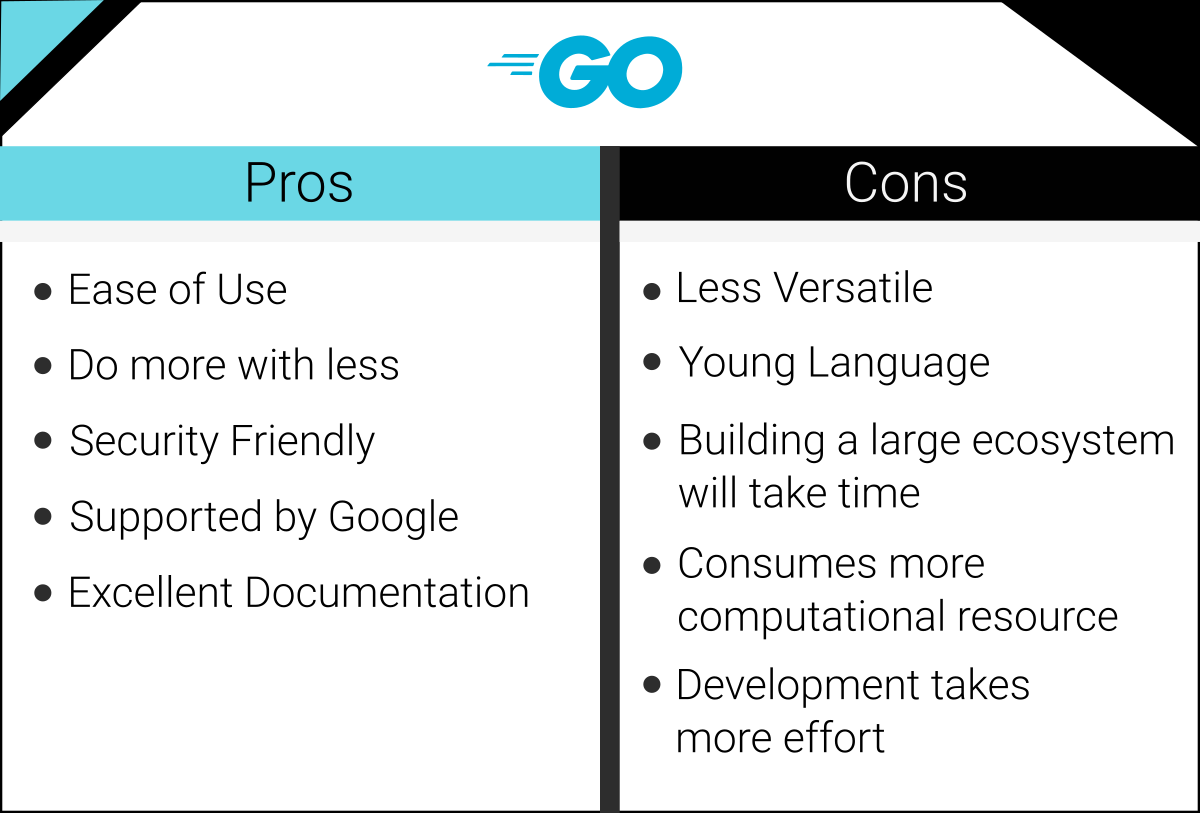 Go is a popular programming language since it offers several advantages. These advantages are as follows:
Go is a popular programming language since it offers several advantages. These advantages are as follows:
- The ease of use: Programmers can understand Go easily, which results in several advantages for organizations. The language features an easy-to-use syntax, therefore, new developers can learn it easily. If you use Go, then your maintenance becomes easier.
- You can do more with less, thanks to the library of Go. Go comes with a powerful yet simple standard library. Programmers can achieve a lot without creating complex pieces of code, thanks to this library! Developers coding in Go don’t need to import secondary libraries.
- Security-friendly language: Since Go is a statically-typed language, the chances of error reduce. That’s an advantage over dynamically-typed languages with a large number of variable types and higher chances of complex coding errors. Also, code written in Go is simpler and easier to debug. The combination of these factors reduces application security vulnerabilities.
- Support from Google: Go has seen important developments and enhancements, and you can count on this trend to continue. Google supports it, and that speaks well for the future of Go.
- Excellent documentation: Not only does Go have excellent documentation, but it goes a step further. Developers that didn’t document their code sufficiently get alerts to put in place the required documentation. This adds to the maintainability of code written in Go.
As with any programming language, Go has a few disadvantages too. These are as follows:
- Less versatile: While the simplicity of Go offers many advantages, however, it also keeps some powerful high-level functionalities away. This makes the language less versatile when you compare it to more complex languages like Swift. E.g., Go doesn’t support generics.
- It’s still early days for Go! Compare Go to Java, and you see what we mean! Despite all its promises, Go can’t match the library support that some of the leading programming languages enjoy. Also, a few other aspects need improvement, e.g., manual memory management, runtime safety, error-handling, etc. Go is still a young language, and it might take a while for it to match the capabilities of its illustrious competitors!
- Consumes more computational resource: Since there’s no virtual machine for this language, the Go files can be far larger than some of the market-leading programming languages. This makes Go consume more RAM.
- Building a large ecosystem for Go will take time: Unlike some of the leading programming languages, Go hasn’t made itself indispensable in any area. As a result, adoption will take longer. Naturally, it will take longer to build a large ecosystem.
- Development can take more effort: Go doesn’t have a UI toolkit library, moreover, it lacks the breadth of development frameworks, unlike its popular competitor languages. At the time of writing this, the major web development frameworks for Go are Gin, Beego, Iris, Echo, Revel, Martini, and Buffalo. Market-leading languages have many more frameworks than Go. You might need to spend more coding effort due to these factors.
Rust and Go: Their similarities
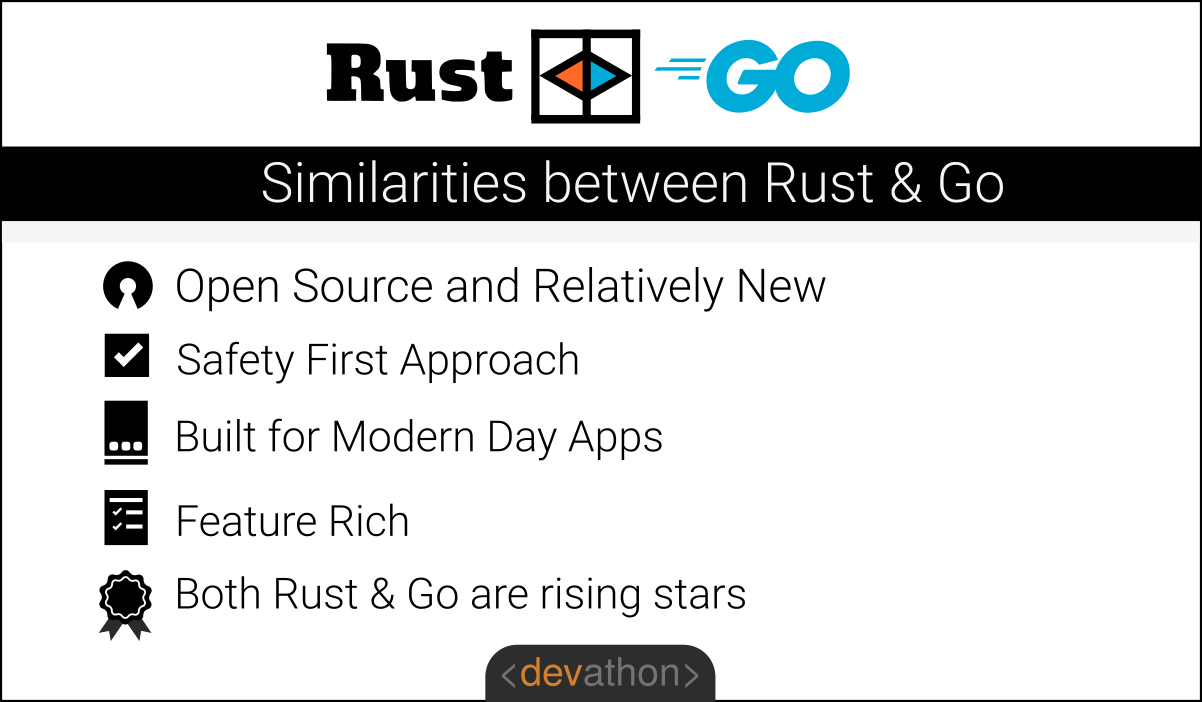 Before we compare Rust vs Go, we need to quickly summarize their similarities as well. These two languages have the following in common:
Before we compare Rust vs Go, we need to quickly summarize their similarities as well. These two languages have the following in common:
- They belong to the modern era: Rust and Go are both open-source languages and both are relatively new.
- Safety-first approach: Since both are statically-typed, they avoid programmers to avoid common coding errors. This reduces application security risks.
- Built for modern-day apps: Parallel computing and microservices architecture have gained a lot of popularity in recent years. By design, both Go and Rust lend themselves easily to these.
- Feature-rich: Both languages offer valuable features that help you to develop modern-day web apps.
- Go and Rust are both rising stars! Their popularity is growing, and both enjoy vibrant community support.
Go vs Rust: Their differences
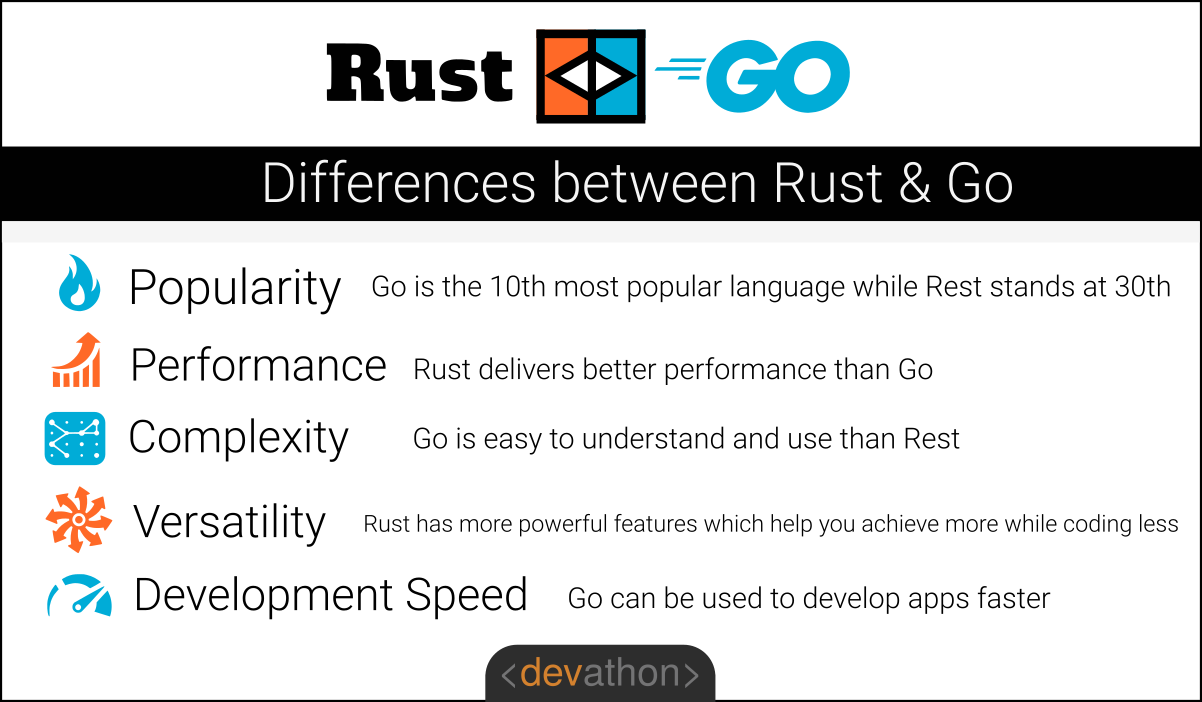 What are the differences between Go vs Rust? These are as follows:
What are the differences between Go vs Rust? These are as follows:
- Popularity: While both Go and Rust are popular, their degree of popularity certainly varies! The TIOBE index for March 2020 identifies Go as the 10th most popular language, however, Rust is in the 30th position. The “Stack Overflow Developer Survey Results 2019” report identifies Go as the 13th most popular technology, while Rust occupies the 21st place. The “HackerRank 2020 Developer Skills Report” identifies Go as the language that most developers want to learn. The HackerRank report places Rust in the 8th position in this regard. You will likely find Go developers easier than Rust programmers.
- Rust vs Go performance: Programs coded in Rust achieve speed like the program codes in C and C++. Rust delivers better performance than Go.
- The ability to build parallel systems: Programming languages that support concurrency better help you to build parallel systems. Concurrency reduces the idle time of a computer system, therefore, languages that support concurrency are popular. Go supports concurrency better than Rust. Your chances of successfully building parallel systems improve if you use Go.
- Complexity: Go is easy to understand and use. Rust has more powerful features, which also increases its complexity.
- Enabling multiple processes to run simultaneously: Programming languages that enable automatic memory management have an advantage. They enable multiple processes to run simultaneously without programmers explicitly allocating and releasing memory. Go enables this. On the other hand, a program written in Rust will not compile unless you have taken care of safe memory allocation. Go helps to run multiple processes to run simultaneously, whereas Rust has a “safety-first” approach in this regard.
- The speed of development: Go is an easy-to-use language, therefore, you can develop apps faster with it. On the other hand, the complexities of Rust can slow down the development.
- Versatility: Rust has more powerful features than Go. You can achieve more with Rust while coding less.
Rust vs Go: Which one should you choose?
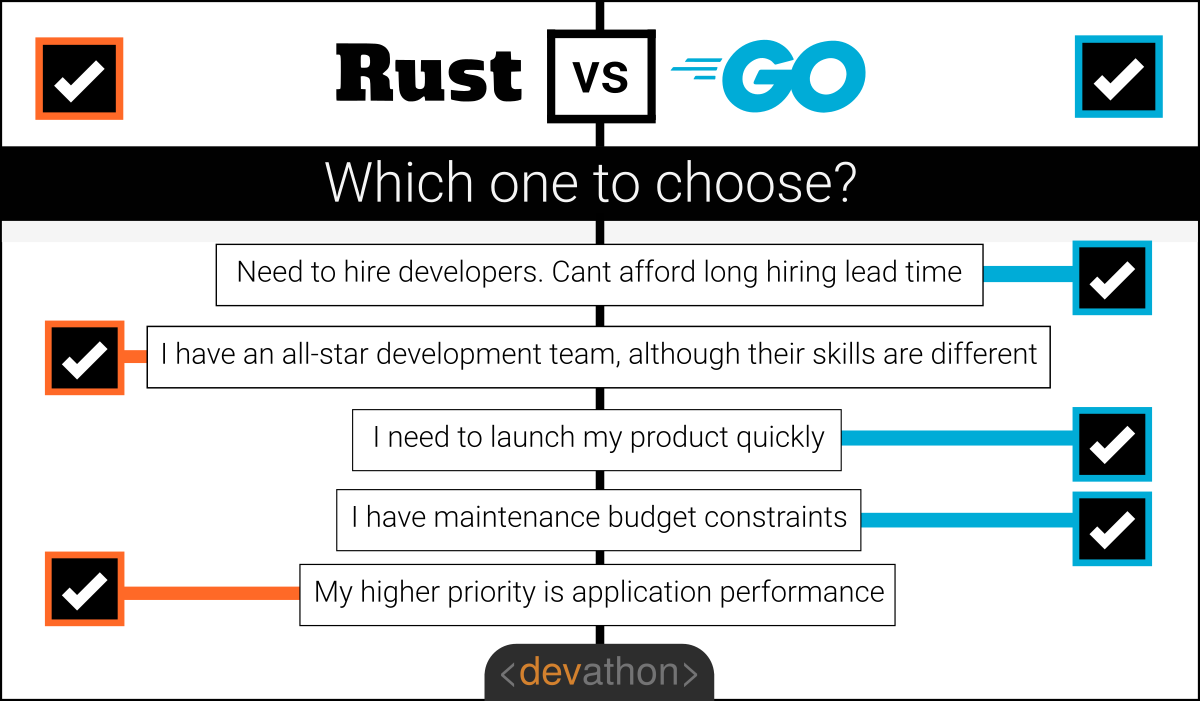 Now that you have a clear idea of Go vs Rust comparison, which one would you choose for your project? The answer lies in your business/organizational context. We will address these questions with the help of a few scenarios that you might be facing. These scenarios are the following:
Now that you have a clear idea of Go vs Rust comparison, which one would you choose for your project? The answer lies in your business/organizational context. We will address these questions with the help of a few scenarios that you might be facing. These scenarios are the following:
- “I need to hire developers, and I can’t afford a long hiring lead-time”: In this scenario, you need to hire developers quickly to get started with your project. Go is more popular than Rust, therefore, you will likely find Go developers quicker. You should choose the Go language in this scenario.
- “I need to utilize existing developers by retraining them”: In this scenario, you already have developers that probably have other skills. Their skills don’t fit your current requirements. You are impressed with their track record and plan to retain them. Therefore, you are looking to reskill them and execute the project with them. Your existing developers will find Go much easier to learn than Rust. Opt for Go, reskill your developers, and get started with your project.
- “I have an all-star development team, although their skills are different”: You are blessed with an excellent development team that has many expert programmers. Due to various reasons, you don’t plan to use their existing skills. Since it’s already a highly competent development team, you should opt for Rust. Experienced programmers will learn Rust quickly enough, thanks to their well-rounded development experience. Since Rust has many powerful features, you can expect the team to code your app in a quick time.
- “I need to launch my product quickly”: You want application development at a quick pace. You should choose the Go language since your team will be able to develop quicker.
- “I have maintenance budget constraints”: You have a constrained budget for application maintenance and support. You need to keep the maintenance costs down, therefore, Go is your best choice. Your maintenance team will find the codebase easy to understand. The simplicity of Go will also help you code with fewer bugs to start with, which ultimately lowers your maintenance costs.
- “My highest priority is application performance”: The Rust vs Go performance scale tilts towards Rust in a pronounced manner. If you prioritize application performance, then you need to choose Rust.
Conclusion
Rust and Go are both increasingly popular programming languages. We have just compared Go vs Rust and demonstrated the strengths and limitations of both. We have also considered the various scenarios you could face and recommended the best course of action. Analyze your business requirements and organizational constraints carefully since they play a key part in choosing between Rust or Go.
Are you looking to get your App built? Contact us at hello@devathon.com or visit our website Devathon to find out how we can breathe life into your vision with beautiful designs, quality development, and continuous testing.



